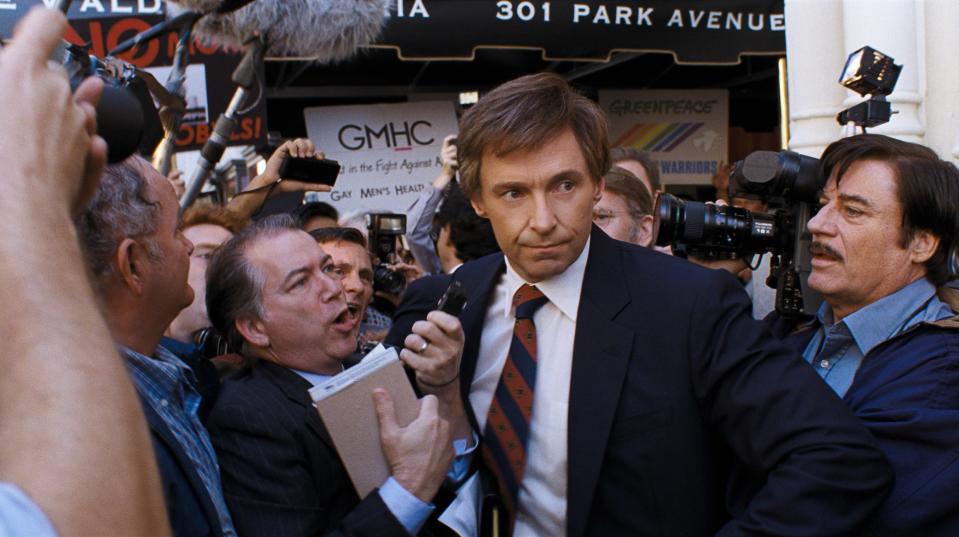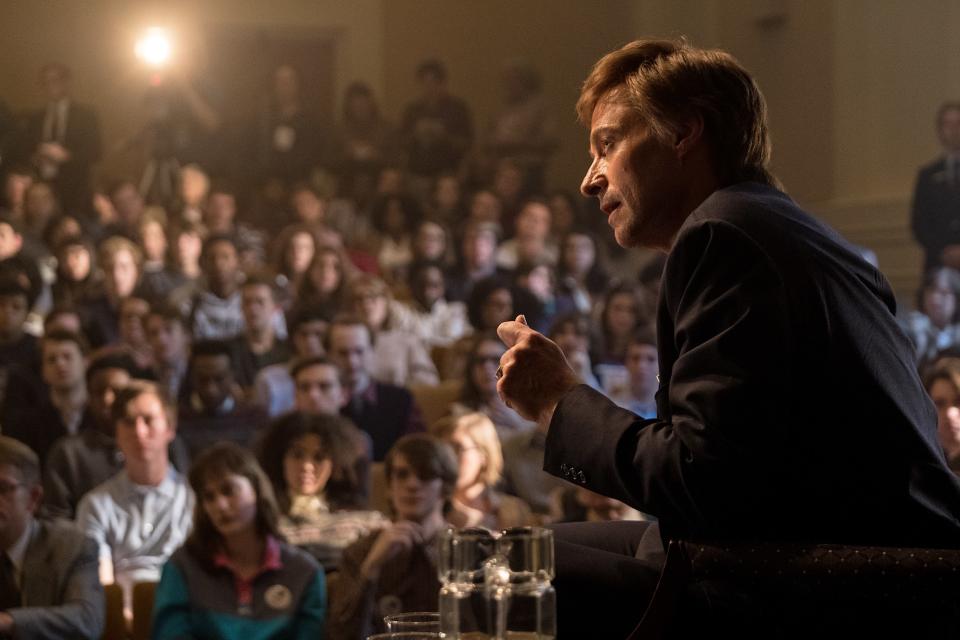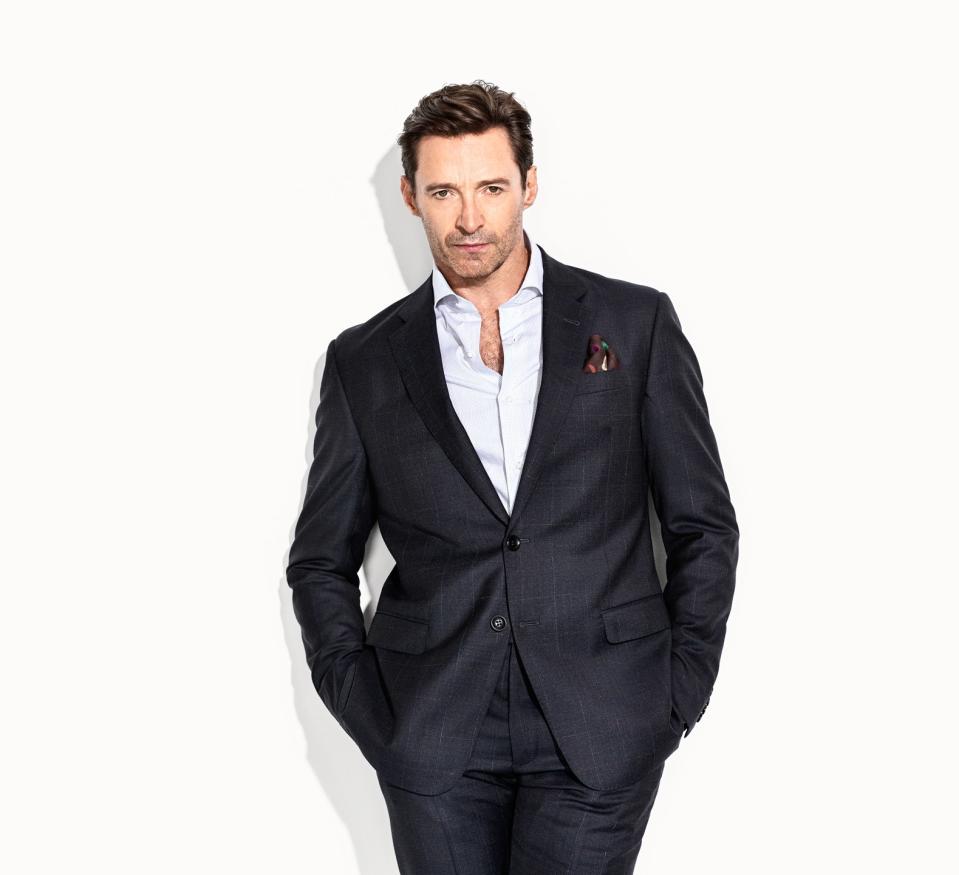Hugh Jackman on Killing Wolverine and Playing an American Politician
Hugh Jackman is sitting at his desk in his study in New York's West Village, contemplating going back to work. "I've had about really eight months off," he says. "I've never really done this before." The idyll will soon end, he says: He's about to start filming Bad Education, a true story about a embezzling Long Island school superintendent — the second real life person he's played in a row. The first is Gary Hart, who he depicts in Jason Reitman's The Front Runner, out this week. Jackman's performance in the film is already being talked about as Oscar-worthy, and with good reason. The film, a busy, Robert Altman-like retelling of Hart's rise as a 1980s political golden boy and his fall, in the midst of the 1988 presidential campaign, when he was caught in an alleged affair, goes a mile a minute, juggling overlapping perspectives and crowded frames—but it's anchored by Jackman, who plays Hart as a proud, unyielding man, whose ironclad self-belief inspires both faith and, eventually, disaster. It's a clinic in charisma, a movie star turn amidst a crowded ensemble of fantastic actors, including Vera Farmiga and J.K. Simmons.
Last year, he retired the character he was best known for, Wolverine. In the fall, he starred in the musical The Greatest Showman, as a singing, all-in P.T. Barnum, a longtime passion project finally made real. And then, for the first time in this century, practically, he got a break. "We did a lot of promotion for The Greatest Showman, " he says, "but generally I've had some time off—it was just a time for me to really sort of just take a step back for the first time in 20 years, really sort of work out the things I wanted to do."
GQ: As I was watching _'The Front Runner', _it occurred to me that this was the first movie role in a long time that I could remember seeing you in where you don't sing or fight. Hugh Jackman: It's a good point. I think I've done nine movies as Wolverine—so there's a bunch of my movies, right? I don't know. I've done plays on Broadway where obviously I've done neither. It always feels a little different to me in that there's been a bunch of movies without—The Prestige, for instance. But you're right. I try to do as many different things as possible. But while saying that, I've done nine films with the same character. So there's some inconsistency to my plan.
You were playing Wolverine long before comic book movies became the default blockbuster film in Hollywood. What was that time like?
Oh my God. When the first X-Men film was coming out—it came out in July and we came back to L.A. after finishing filming it around February, so I had like three or four months before the film came out. And I remember my friends saying: "Make sure you book another movie before this thing comes out, man, because no one likes comic book movies. They're dead. There hasn't been one for years and so it's probably going to die a death. So make sure you're at least working when it comes out." No one saw it coming. I don't know what the numbers at Comic-Con were back then but I would say it was like a quarter of the size it is now. And the Internet of course has exposed so much more of what was a subculture. Which is now really the mainstream culture.
When do you think comic book films went fully mainstream?
I think it did start with X-Men. Then Spider-Man came in and pretty much permanently cemented it. But for me I would I would say that Christopher Nolan took it over the top, because Nolan made a film that was not just considered a genre film, but really kind of crossed over into being just a film. And by that point—was Iron Man out? Or maybe it was in the works. I'm not sure. But hey, it's funny as I'm talking to you, [now president of Marvel Studios] Kevin Feige, he was the associate producer on X-Men. I remember he had an office filled with comic book figures and action figures and things and posters. And he was working for Lauren Shuler Donner, who was the producer. So it was not long after that he began to ascend. But you know he's a true, true fanboy. He absolutely loved it.

The Front Runner
Sony PicturesYou probably would not have been like: "This guy is going to be one of the most powerful people in my entire industry."
I don't think I saw that coming. But then again, I thought I was going to be fired most days. So I wasn't really judging other people in their jobs at the time.
As someone who thinks a lot about creative work, could you have predicted how much real estate these films would eventually occupy in the general moviegoer consciousness?
It has surprised me. I remember when hip hop came on the scene, no one saw that lasting or becoming the dominant part of pop culture. I don't think I saw comic book movies being as successful or having as a long run or this much of a saturation. I didn't see that coming. But then again I'm not your traditional consumer of it either, really. I don't know if you know—I'd never read a comic book really when I was cast. I certainly had never read an X-Men comic when I was young. When I auditioned, I hadn't heard of it. But having said that, I love Iron Man, Batman, I love The Avengers—there's so many really, really good movies that are fun, that have spectacle, and you care about the characters. And I think the reason it's hanging in there is people fall in love with the characters. And you can't ever forget: it's about story ultimately.
It must be strange, as someone who didn't grow up reading comic books, to find yourself so closely identified with a character named Wolverine.
I'm thrilled about it, to be honest. I feel really lucky to have come into the business at the time when I did, and I'm thrilled that none of the fans knew I'd just been doing Oklahoma on the West End. They wouldn't have believed Wolverine with a perm in his hair could possibly play the part. But there's a lot of things that happened in my favor and I'm proud to be part of it. I'm proud to be part of, I suppose, the building of that culture. And I really enjoy watching where it's going. I look forward to seeing who's going to be playing Wolverine next.
What about Gary Hart made you want to play him in a movie?
I'm very interested by people who occupy the office, or potentially want to occupy the office, of president. I mean that is a fascinating character study. What kind of person puts a hand up and believes that they should be the one to lead the free world? I'm also interested in the world of politics. It's such a chaotic and pressure-filled cauldron and I'm fascinated by that. But I probably connected with Gary in a couple of different ways. One is, he's exactly the same age as my father, and some elements of him remind me of my father: very deeply principled man, private man, ethical and from a religious background like my father. And hard to get to know. You know, there's just some parts of my father who feel like I'm not quite sure I ever got to know. There were parts reserved. That's partly of a generational thing, but that intrigued me. And Gary also had—he has—a searing intellect. My brother is a Rhodes Scholar and one of the smartest people I've ever met. And so when I'm around him he reminds me of being around Gary—just the smartest guy in the room. And I marvel at some of the things that come out of Gary's mouth and he, even to this day, talking about world affairs or Australian politics, you name it, he's just so thoughtful, so knowledgeable, and insightful. And he had this ability to see 15 years in the future. I do not have that ability, and very few people do. And very few leaders do. He had a way of seeing the future and seeing how society should adjust to cope with that change. And regardless of whether you think he should be president or not, and the film does not answer that question for you if you're looking for it, I feel it's a loss to public life that we lost his voice on various subjects.
And the other thing that attracted me was it scared me. It scared the hell out of me for a number of reasons. One because I got to know Gary, but even before I met him, playing someone who was alive, who is going to see the film, who you know you're reenacting probably the worst three weeks of that person's life, that has a massive pressure, I think. Our stories, who we are and how we present ourselves to the world, are probably the most precious thing to most people. So the responsibility of that I certainly do not take for granted. And also playing someone who is guarded and enigmatic and mercurial. I'm not like that. I'm a bit of an open book. What you see what you get. If you ask me a question, I'll answer it, probably more than you want to hear. And Gary is not like that. He's a very, very private person and so portraying someone sort of charismatic and mercurial and at times elusive, was a huge challenge.
"I'm thrilled that none of the fans knew I'd just been doing Oklahoma on the West End. They wouldn't have believed Wolverine with a perm in his hair could possibly play the part."
The movie pretty strongly suggests that this was a Pandora's Box moment in our society, after which everything became fair game for the press and the public. . Yeah. He didn't want to open that Pandora's box. You know, the polls of the time were in his favor, saying, "The public think the press is going to far." But we all know that it was inevitable. And so we watched that movie going, "Ah, dude, it's not going to go away. It's never going to go away. Answer the question." But he didn't want to be part of the dismantling.

The Front Runner
Frank Masi/Sony PicturesOne thing the film is about is a public figure reckoning with just how much he owes the public, which is a question I'm sure you've had to ask yourself as well. Did you relate?
On a very minor level. I have made mistakes publicly. I have been told by family members, "Dude, that's my story as well. So if you could back off on that..." And: good point! I've learned over the years—my basic view of life is I pretend to be other people for a living. I don't want to do that off camera, or offstage. I just don't have the energy or the time or the desire to do it. And the reason I weirdly pretend to be other people—this may sound sort of ass backwards—but the reason I do it is to actually understand life, humanity, myself, and why we're here. I do believe that it gives you great insight into those things. And so my goal in life is to probably be more authentic, more honest, which is weird, coming from someone who, you know, bullshits for living and dresses up as other people. But that's my goal. So I try to be as transparent as I can even when doing press. I try not to sort of manipulate, even though I'm aware that somehow subconsciously all of us do that all the time, because we don't really want to show the parts of ourselves we don't like.
You were the guy from the comic book movies for so long. Who will you be now?
I don't know. I'm really proud of The Front Runner. It's been an interesting journey for me. I think ten years ago there was a period where I was, I think, probably considered to be just the guy from the superhero movie. Some people knew me from Broadway. I remember a few people pulling me aside like, "Dude, you gotta pick a lane because people don't really know how to pigeonhole you and they don't really know what you're about." And I always rejected that idea, just because that's not what the fun of acting was to me. I love the challenge of doing different things, and somehow I think lately it's sort of been coming around, where the variety of the things I've done has weirdly become my calling card, I suppose, and become a strength.


